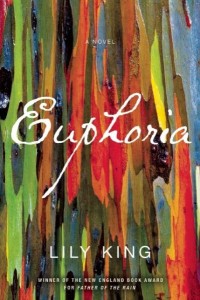 As semesters wind down to their close, I thought I would make a suggestion for summer reading. Or rather, summer reading is an excuse to push a book on you that I think you will enjoy and that I think is remarkable: I recently finished the 2014 novel Euphoria, by Lily King, and feel compelled to missionize on its behalf.
As semesters wind down to their close, I thought I would make a suggestion for summer reading. Or rather, summer reading is an excuse to push a book on you that I think you will enjoy and that I think is remarkable: I recently finished the 2014 novel Euphoria, by Lily King, and feel compelled to missionize on its behalf.
It is a novel based loosely on an episode in the live of Margaret Mead and two of her husbands, Reo Fortune and Gregory Bateson, and features a sort of cameo by Ruth Benedict and her epochal book Patterns of Culture. That description itself may interest many of the readers of this blog—how often are giants of US intellectual history fictionalized, after all?—but let me now try to convey a little bit of what captivated me so about this novel.
Euphoria is one of very few novels that I’ve read—along with, perhaps, The Magic Mountain, The Golden Notebook
, Possession, Lanark, Arrowsmith, Proust, The Left Hand of Darkness, maybe a few others—that truly communicates the sensation of intellectual completion that one feels when whole systems of thought come into alignment, when all the chaotic moving parts of a program of research stay still for once, when everything suddenly swims into your ken at once and in perfect synchronization. It is the instant in which one sees the “figure in the carpet.” Here is how Nell Stone, the character in the novel who is based on Margaret Mead, describes it:
It’s that moment about two months in[to fieldwork], when you think you’ve finally got a handle on the place. Suddenly it feels within your grasp. It’s a delusion—you’ve only been there eight weeks—and it’s followed by the complete despair of ever understanding anything. But at that moment the place feels entirely yours. It’s the briefest, purest euphoria. (19)
Out of context, this passage may well be underwhelming, but that is in a sense what I mean by the novel “communicating,” rather than merely depicting or describing, the sensation: communicating in the sense of touching, sending a little tremor or frisson, awakening an echo of similar such moments in one’s own intellectual career. A single passage may crystallize what is being consistently worked out in the life of the novel, but it will inevitably be damaged and diminished by extraction.
A few more thoughts about this euphoria: For a passage of pure description of this experience—one we are not meant to share because it is from the very first moment ironized—we might think of Casaubon’s belief that he has forged the Key to All Mythologies in Middlemarch. And, it is important to note, that the kind of passage I am trying to describe communicates a purely intellectual euphoria: there is not meant to be any hint of a mystical (or drug-induced) dimension to the experience.
Allow me to expand that last thought just a little more: as you can see from the quoted passage, this euphoria is narrated as a sensation of possessing and not—as in a mystical experience or in intoxication—as a sensation of being possessed. Note that this sensation is named as euphoria and not ecstasy: its original sense is not of losing the self but rather something closer to the feeling one gets at the point a fever breaks, a sense that has been transferred, I suppose, to the euphoric feeling known as the “runner’s high.” It is a feeling less of transcendence than sublation.
Especially in the case of the ethnographic encounter, it is difficult if not impossible for this possessing not to be an act of colonization as well, and in all instances it is both experienced and narrated as an act of mastery. King’s novel is self-reflective on this point, or, rather, her characters are, but there are other novels—for instance Saul Bellow’s Henderson the Rain King—which dramatize the same euphoric sensation with unabashed pleasure in this colonial aspect. Perhaps the saving grace of King’s version (and I think this holds true for most of the euphoric moments in the texts I named above) is its acknowledged transience: euphoria is not a permanent achievement, it is even a delusion—like poetry, it makes nothing happen. Euphoria is a side effect of intellectual pursuits, but not their purpose or end. (For Bellow, for what it’s worth, that is almost never the case because he usually sticks these euphoric moments at the end of his novels, leaving his protagonists suspended in their mastery, as if they’ve made a permanent breakthrough to some higher intellectual plane—Augie being the most famous or most extreme example, but Albert Corde being another good one.)
This all has taken us rather far afield from the novel itself, but my point was to urge you to check it out rather than to report on it. In fact, I had intended to urge you to do that but also to reflect a little bit less on euphoria itself and more on a word that, given the conjuncture in which I read the novel, seemed to haunt its pages: the antonym of euphoria—dysphoria.
Although it is not limited to this application, one of the most common places in which the word “dysphoria” shows up now is in the term “gender dysphoria,” a term which has increasingly replaced the cruelly pathologizing term “gender identity disorder,” but which itself is criticized (correctly) for being pathologizing and is being replaced in some cases by “gender incongruence.” We have not yet talked on this blog about Bruce Jenner—an omission that may seem appropriate to some of our readers, given some of the snarky comments I’ve heard about the brief appearance of Kim Kardashian’s name in a plenary at last year’s SUSIH conference—but next week I intend to talk a little about the idea of dysphoria, building off some of my comments and observations here. I also intend to talk about another text which I think is quite remarkable, and necessary, especially in a conversation about dysphoria: Claudia Rankine’s masterpiece Citizen: An American Lyric.
Until then.

One Thought on this Post
S-USIH Comment Policy
We ask that those who participate in the discussions generated in the Comments section do so with the same decorum as they would in any other academic setting or context. Since the USIH bloggers write under our real names, we would prefer that our commenters also identify themselves by their real name. As our primary goal is to stimulate and engage in fruitful and productive discussion, ad hominem attacks (personal or professional), unnecessary insults, and/or mean-spiritedness have no place in the USIH Blog’s Comments section. Therefore, we reserve the right to remove any comments that contain any of the above and/or are not intended to further the discussion of the topic of the post. We welcome suggestions for corrections to any of our posts. As the official blog of the Society of US Intellectual History, we hope to foster a diverse community of scholars and readers who engage with one another in discussions of US intellectual history, broadly understood.
This is a lovely piece. For some reason, I am reminded of the novels of Nicholas Mosley, which also dramatize moments of intellectual euphoria in a variety of ingenious ways.
And looking forward to your piece on Rankine!